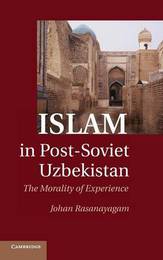
|
Islam in Post-Soviet Uzbekistan: The Morality of Experience
Hardback
Main Details
| Title |
Islam in Post-Soviet Uzbekistan: The Morality of Experience
|
| Authors and Contributors |
By (author) Johan Rasanayagam
|
| Physical Properties |
| Format:Hardback | | Pages:296 | | Dimensions(mm): Height 235,Width 158 |
|
| Category/Genre | Islam |
|---|
| ISBN/Barcode |
9781107000292
|
| Classifications | Dewey:297.09587 |
|---|
| Audience | | Professional & Vocational | |
|---|
|
Publishing Details |
| Publisher |
Cambridge University Press
|
| Imprint |
Cambridge University Press
|
| Publication Date |
8 November 2010 |
| Publication Country |
United Kingdom
|
Description
The Uzbekistan government has been criticized for its brutal suppression of its Muslim population. This book, which is based on the author's intimate acquaintance with the region and several years of ethnographic research, is about how Muslims in this part of the world negotiate their religious practices despite the restraints of a stifling authoritarian regime. Fascinatingly, the book also shows how the restrictive atmosphere has actually helped shape the moral context of people's lives, and how understandings of what it means to be a Muslim emerge creatively out of lived experience.
Author Biography
Johan Rasanayagam is Lecturer in Social Anthropology at the University of Aberdeen. Dr Rasanayagam's works have been published in numerous journals, including the Journal of the Royal Anthropological Institute and the Central Asian Survey.
Reviews'For the novice to the field the book serves as a good introduction to the meanings of Islam in the area; for those well-versed in the field of Central Asian studies it is very important reading, not least because of its engagement with theory as well as the broader literature on the wider Islamic world (still rare in the field of Central Asian studies). I find [Rasanayagam's] attempt to bring the material into dialogue with current theoretical discussions on morality within anthropology particularly illuminating ... Scholars and students interested in the anthropology of morality would find his discussions of experience as a moral source most interesting, and scholars interested in religion, politics and ideology would find lots of inspiration in the book as well.' Maria Louw, Contemporary Islam '... this is a very good book that should be read more broadly by social scientists interested in religion and politics, emotions and everyday life, and moral and social development.' David W. Montgomery, Ethnos '... Islam in Post-Soviet Uzbekistan is a considerable contribution to our understanding of the thorough transformations of the Central Asian region and Muslim societies on the whole, and anyone concerned with these issues will definitely benefit immensely from reading it.' David Henig, History and Anthropology
|